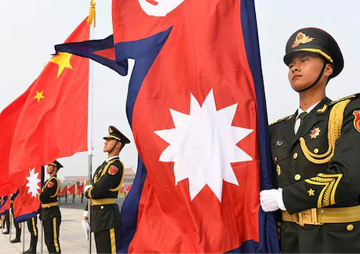"The global trade and investment regime has been undergoing significant changes in recent years with the emergence of the most recent hybrid of trade agreements, the mega regionals like the recently concluded Trans-Pacific Partnership (TPP), Transatlantic Trade and Investment Partnership (TTIP) and Comprehensive Economic and Trade Agreement(CETA). These three deals steered by developed economies are projected to be immensely consequential for world trade, as they are not simply about lowering tariffs between the parties to expand trade, but also propose to discuss and resolve new issues in global trade related to environment and labour among others, as opposed to the traditional issue of tariff reduction.1
A common thread that runs through all the three deals is the Investor-state dispute settlement system (ISDS), an opaque supranational court that decides disputes between foreign governments and corporations, bypassing the domestic courts and national laws. For the United States, 'high standard' stands for investment protection and ISDS. From their perspective, the ISDS clause is non-negotiable in both the TPP, a pact which President Barak Obama has often projected as a model to ""rewrite the rules of the global economy""2 , as well as the TTIP.
The TTIP negotiations, meanwhile, have taken a backseat with the now-notorious ISDS proposal facing public backlash in the EU, which prompted the European Commissioner for Trade to release a new blueprint for ISDS mechanism to create a standing appellate mechanism -- absent in the existing ISDS mechanism -- and make the proposed 'investment court system' work more like traditional court system. Looming in the background is the EU-Canada agreement (CETA), the negotiations for which were concluded just when the TTIP negotiations were launched in early 2013, with CETA widely believed to serve as a blueprint for TTIP negotiations. CETA also contains the controversial ISDS clause, which is likely to be emulated in the TTIP3 , and there is a fear that the Canada-based US companies would use ISDS in CETA to bring action against European governments. As one would expect, there is now a clamour to reopen negotiations on the Investment chapter of CETA. However, Canada's newly-elected government has hinted a go-ahead for the pro-investor TPP in its current form, and it remains to be seen how the European Parliament manages to have its way in the current scenario.
While the final substance of the TPP agreement remains unknown till the text is made public, there is news that the agreement text won't be made public for four years 4. What is known so far is that the US has been demanding provisions which are similar in other FTAs of US as the model provisions for the TPP text. The US already has FTAs containing ISDS with most of the TPP participating countries.
So, does that imply Americanisation of the global investment regime?
With the TPP leading the latest offensive for liberalisation of trade and investment, the answer seems to reside somewhere between the recent trend of developing countries withdrawing from the International Centre for Settlement of Investment Disputes, terminating BITs or negotiating investment treaties without the controversial ISDS mechanism (Latin American countries being at the forefront of the war against what they call as 'strait-jacketing of developing countries'); and the tendency of poor and middle-income countries to enter into BITs with developed countries despite all their grumblings about the system.
But the foreign investors taking on governments of host states for arbitrarily targeting them has been customary international law for the longest time in the absence of tangible domestic legal or political environment to protect investor rights. The BIT regime strengthens these rights by committing the host country to the minimum standards of protection to be granted to the foreign investor, rather than doing it on a case-by-case basis. It is a popular instrument for developing countries -- faced with the twin exigencies of encouraging foreign investment for propelling economic growth, and safeguarding their sovereign right to regulate any investment activity in favour of legitimate public welfare objectives -- to make them more attractive destinations for FDI.
So, is the TPP unjustifiably getting negative attention for raising ISDS's profile? The BITs in force arguably follow the trend set by the North American Free Trade Agreement (NAFTA). NAFTA, remarkably, has been the trend-setter in all the trade agreements of the US with the Central and Latin American countries, including the US-Equador BIT, which was used by Occidental Petroleum Corporation to win the largest ever award by ICSID, deciding on controversial issues, including the principle of proportionality and the assessment of damages. Investors surely need protection, but ISDS goes a step ahead in making the State compensate investors for losses even when the profits are made from causing public harm. The most recent in this series being Philip Morris International, which is currently prosecuting such cases against Australia and Uruguay for requiring cigarettes to carry warning labels.
There are, thus, fears that the NAFTA-based investor-state dispute settlement model, with improved protections for investors will be incorporated in mega-regionals. Traditional BITs may finally be on the decline, but the emergence of these new hybrid trade deals might just end up producing managed rather than free trade. Regardless of whether emerging economies like India and China join these negotiations or not, the mega regionals, led by the TPP, will most likely exert pressure on these countries to either provide similar protection to the foreign investors or risk trade isolation.
1. Geethanjali Nataraj, Abhirup Bhunia, Garima Sahdev, The Changing Global Trade Regime and the Emergence of Mega-FTAs, 56 OBSERVER RESEARCH FOUNDATION OCCASIONAL PAPER, Jan. 2015 at 10.
2. https://www.whitehouse.gov/the-press-office/2015/10/10/weekly-address-writing-rules-global-economy
3. Comprehensive Economic and Trade Agreement art. X.9, E.U.-Can., available at http://trade.ec.europa.eu/doclib/docs/2014/september/tradoc_152806.pdf
(Provides Investment Protection to foreign investors, and guarantees a ""fair and equitable treatment and full protection and security"").
4. http://www.independent.co.uk/news/business/news/tpp-trade-agreement-text-won-t-be-made-public-for-four-years-a6680476.html "
The views expressed above belong to the author(s). ORF research and analyses now available on Telegram! Click here to access our curated content — blogs, longforms and interviews.




 PREV
PREV

